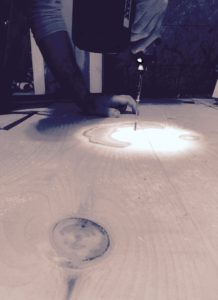What is grief?
It’s a protest about accepting that somebody isn’t in your life anymore.
Grief is the negotiation of not wanting it to be true, but it is true, and the gap between the two causes extreme sadness, anxiety, anger…anything.
How do you manage that?
I like talking about it.
The more you can talk about it, the more you learn to live with it, the more you make peace with it.
I had a really hard time talking about a very close friend who took his life. Suicide is particularly difficult because it has a stigma and it’s jarring….you know, when someone just decides to not be there anymore.
It’s hard to respect that decision.
But I realized that if you can’t talk about something, then you haven’t processed it.
And talking about it forces you to figure out your relationship with it.
Putting things into words creates boundaries, and boundaries form ideas out of what was before just a big lump inside.
Otherwise you are truly losing the person.
How do you mean?
When somebody dies they are not in your living life anymore, but they are still a part of your life.
And if you can’t talk about them because you can’t separate their living life from the fact that they have left you – then it is a real tragedy – then you have truly lost your friend.
The word is ACCEPTANCE.
It tears your world up until you can accept it. When you lose somebody close to you, and you haven’t accepted it, it makes it harder to accept other parts of reality. And that turns into, ‘why should I get out of bed and put on pants and drink a cup of coffee and go to my job?’
What’s the point of anything?
And that’s a tough way to live.
When I found I was able to talk about losing my friends, that taught me I was reaching a point of acceptance.
Did learning to accept your grief help you in other ways?
Certainly with anxiety.
Fighting anxiety makes it worse, gives it power, makes it bigger than it needs to be.
As soon as you accept it, that’s about half of your anxiety gone right there.
Grief was a huge opportunity for me to put that into motion.
A big loss in your life ripples through everything. It leaves a palpable hole that you then have to build a relationship with and that forces you to reevaluate other areas that need attention.
Has grief helped you in other areas?
It gives you a perspective which gives you power.
Grief wipes the lens off a bit, it gives you a weird clarity.
It really taught me to prioritize spending time with the people I love. It forces you to evaluate what you are doing and reminds you to live by the moment because it’s all very fleeting. You look back on the time you spent with somebody and you didn’t realize there was going to be a limit.
Of course there is a hole from what we have lost, but because of it, I’m aware of what kind of a hole there could be if I don’t appreciate.
When you have reached an acceptance point is when you think more of the time you had with them than the time you have had without them.
Be thankful you can tell stories about them.
One of the greatest gifts grief has given me is perspective also.
A lot of it comes down to choice and how you choose to see things.
Learning to cope with loss taught me about learning to cope with everything.
You can’t change the past, you have to appreciate the road that got you where you are – whatever it is – you know, I hated middle school. There’s a point in your life where you become so self aware, ‘Oh my god,who am I? What am I doing?’
Everybody has a meltdown point.
And anytime you are depressed or angry, you have to value those times as much as idyllic summer camp because that’s the road that got you to where you are.
You have to look at it and thank it.
So thank you dudes in Taunton for being such dicks to me because now I am who I am.
I hope I never have to put up against something like Auschwitz, but it all builds character, puts hair on your chest, and not in a macho way.
Everybody has their own civil war.
You need to try and be in harmony with your brain.
The things you live through – bad and good – are part of who you are and you have to value them.
Who would you be without your pain?
I wouldn’t be me. It makes you who you are. There is no other way. There is only one path behind you, and if you look back, it comes from a place of anxiety.
You’ve made your decisions and now it doesn’t really matter.
The more you look out in the world and find validation, that makes it easier to be comfortable with the way you feel.
You get to choose, “I can embrace this. I don’t have to bury it.”


